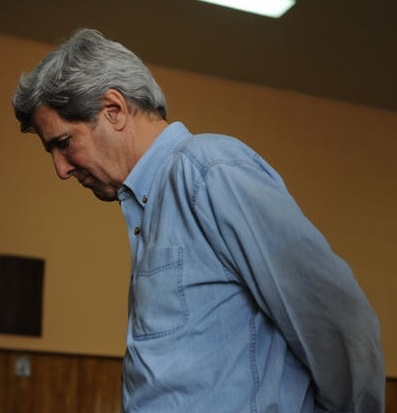
John Kerry on his quick visit to Afghanistan and Pakistan over the weekend / Department of State photo by S.K. Vemmer
John Kerry, the Massachusetts Democrat, has long had a hankering to serve as the nation’s top diplomat. Over the past weekend, he was on a whirlwind tour of the AfPak theater, where his words garnered headlines usually accorded the secretary of state:
Afghanistan May Be Open To New Path, Kerry Says, according to Sunday’s New York Times.
Kerry: U.S. Relationship With Pakistan At “Critical Moment” read Monday’s Washington Post.
Tuesday, he completes his diplomatic tour de force — when he holds a foreign-relations committee into the increasingly rocky U.S.-Pakistan relationship.
Kerry seems to be carrying messages from the Obama Administration, which makes sense if he’s auditioning to succeed Hillary Clinton, who has made clear she’s not going to serve in a second Obama term — if there is one — as secretary of state. At such a fraught time in U.S.-Pakistani relations, it’s convenient to have a lawmaker with Kerry’s clout touching base in Afghanistan and Pakistan without the full weight of the Obama Administration behind him. Assuming both deliver the same message, it shows resolve in the U.S. executive and legislative branches that could prove handy.
“I’m very pleased to say that these meetings have in fact reopened the dialogue between our countries,” Kerry said. “They reassure and put us in a position to reassure each other that we can go forward toward a better partnership with Pakistan and its people.” And he added a Kerryesque flourish: “I said I think last Sunday on national television in America that I believed this was a moment of opportunity for us to recalibrate, to readjust, to tweak, and to use this opportunity to push a reset button as we go forward.” No mere WBZ-Boston for this guy.
His key message: despite increasing calls for the U.S. to cut off the roughly $2 billion in annual aid it gives Pakistan, Kerry repeated the Administration line that “there is too much at stake” for Osama bin Laden’s long-time presence in a Pakistani military town to ditch their relationship. “There are real differences between our two countries, but the bonds that tie us together in the fight against the threat of extremists is stronger than those differences,” he told reporters in Islamabad on Monday before heading home. He added that the two sides have agreed on steps, which he declined to disclose, to improve the relationship.
Kerry’s announcement that Clinton soon would travel to Pakistan left State Department spokesman Mark Toner a bit ruffled. “I don’t have any specific details to announce,” he said. “Obviously we do that normally through a travel announcement.” He added that discussions about her upcoming trip were now underway. And — perhaps to keep Kerry in check — he noted that in the past 24 hours, Clinton had spoken with President Asif Ali Zardari, Prime Minister Yousuf Raza Gilani, and General Ashfaq Pervez Kayani, the Pakistani army chief of staff.
“My trip to Pakistan this week only confirmed for me the vital importance of this relationship,” Kerry said in a statement announcing Tuesday’s hearing. “The committee will continue to examine how we can move forward in a manner that strengthens our national security interests and affirms our relationship with the people of Pakistan.” The hearing, while long-scheduled, represents “a good opportunity for Kerry to continue his audition for secretary of state,” says a longtime Senate aide, foreign-affairs maven and Kerry-watcher. “He has to walk a fine line, defending Senate prerogatives yet not challenging the Administration head on. I think he’s walking it pretty well — he looks authoritative, he’s conveying Congress’ displeasure, but he’s not undermining Obama.”
The sole witness listed is former national security adviser James Jones, who spoke extensively about Pakistan during a luncheon Monday at the National Press Club. “While Pakistan should be given credit for some incremental progress in rooting out some terrorists within their borders, notably in the Swat Valley and South Waziristan,” Jones said, “the undeniable fact is that since their deeply flawed decision to not put their army along the border with Afghanistan (in North Waziristan)…thinking that the tribes, in exchange for the army not being present, would patrol the border and prevent illegal crossings.”
That’s why on Monday, with Kerry making nice to the Pakistanis, four drone missiles — all-but-certainly launched by the CIA — killed up to 12 suspected militants just inside Pakistan’s border with Afghanistan in North Waziristan.


